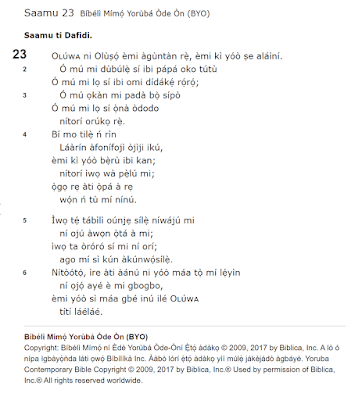Seeking calm for the
soul
Meditating on Psalm
23, because I was inspired and directed to look at the context of the first
part of verse 3, ‘He restoreth my soul:’, my quest for calmness and peace
brought me to a newer understanding of this Psalm along with a much needed
peace. [Psalm 23 – BibleHub –
KJV]
I would normally
start my Bible study with the King
James Version (KJV) and then access other translations as the Amplified
Bible (AMP), The
Message (MSG), New
Living Translation (NLT) and the New
King James Version (NKJV). I addressed the differences in the Bible
translations in a blog I wrote in 2013.
Tongues are changing
Then, much as English
is my mother tongue, Yorùbá,
spoken in southwestern Nigeria is my mother’s tongue. I learnt Yorùbá under
duress because my mother insisted on my reading the Psalms in Yorùbá rather
than in English, though I did my Anglican confirmation study in English.
I then happened upon
the Yoruba Contemporary Bible Copyright © 2009, 2017 by Biblica, Inc.® - BÍBÉLÌ MÍMỌ́ YORÙBÁ ÒDE ÒNÍ (BYO) on the Bible Gateway website, which jumped
directly to my reference text of Psalm 23.
I did not
realise it was a different Yorùbá translation until I read the beginning of the
first verse, "The Lord is my shepherd..." which now, had a literal
translation of "The Lord is the shepherd and I am His sheep."
"Olúwa ni
Olùṣọ́
èmi àgùntàn rẹ̀"(BYO)
For I remember my
traditional Yorùbá Bible writing that as, "Olúwa li Olùṣọ́-àgùntàn mi."
I was in for a treat,
a revelatory one at that.
It was like the
Amplified Yorùbá version, and read quite differently, even more expository,
somewhat abandoning the classic Yorùbá grammar for an easily accessible
vernacular.
Old
Bible
I just found an old Yorùbá
Bible by the Bible Society of Nigeria © 1960 and the differences in the text
are starker than I realised. The accent diacritical marks are only applied for
context and not on every word. ‘Li’ is used rather than ‘Ni’ for the English ‘Is’.
My observations are not exhaustive, just a point of interest.
Comparing the ancient
to the modern
Psalms in the old Yorùbá Bible was Orin Dáfídì which
translates to Songs of David, but the BYO has not attempted to translate the name of the book at all
but left it as Saamu without the diacritical marks. Taking liberties, one would
think, saying an English word with a
I have nothing against
modernising religious instruction for easy consumption and lax grammar rules, it just
sometimes makes it quite unfamiliar to those of us brought up on the
traditional text. It's the same thing when in the Anglican Church, the Apostle's
Creed I was confirmed with does not read like the Nicene
Creed of the current liturgy and when saying The
Lord's Prayer, 'Thy kingdom come' could attract disapproving looks in
church, as I might be reciting an 17th Century version when the rest
of the church is living in the 20th Century.
In all, it is quite fascinating
how so much more insight can be gained from meditating on Psalm 23 that I have probably repetitively recited a million times and yet, it yields new meaning.



No comments:
Post a Comment
Comments are accepted if in context to the blog, polite and hopefully without the use of expletives.
Please, show your name instead of defaulting to Anonymous, it helps to know who is commenting.
Links should only refer to the commenter's profile, not to businesses or promotions, as they will NOT be published.
Thank you for commenting on my blog.